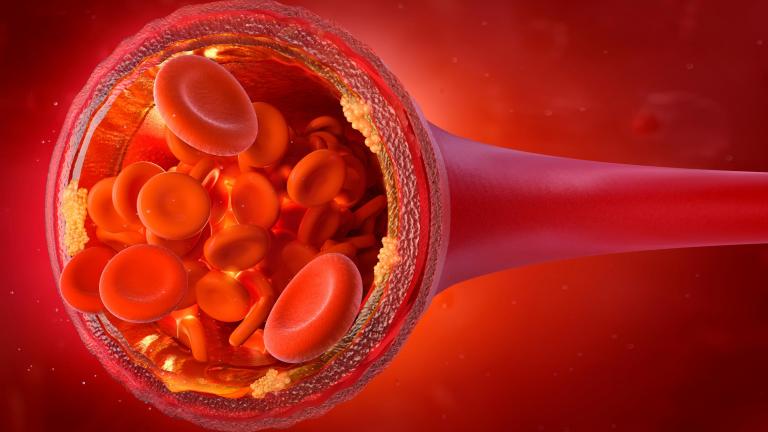Cholesterol Baytown
Introduction:
Cholesterol is an oil-based, fatty substance that is carried around the body in the blood. It is needed to build new cells, insulate nerves, and produce hormones.
Your liver produces most of the cholesterol needed for your body. The rest comes from foods including animal meat, poultry, and full-fat dairy products. Excess intake of these foods can cause your liver to make more cholesterin than it otherwise would.
Too much cholesterin can be dangerous. Over time, it builds up in the inner walls of the arteries and makes them narrow and less flexible. This condition is known as atherosclerosis.
Atherosclerosis is a major cause of coronary heart disease worldwide. It can lead to blockage of arteries that supply blood to the heart, resulting in chest pain. Complete blockage by a clot formation on top of a narrowed artery can result in a heart attack.

Symptoms:
High cholesterol does not have any symptoms. Over decades, it can lead to a build-up of fatty plaques in the arteries, which also do not have signs or symptoms. If these plaques rupture, they can cause heart attack or stroke in otherwise asymptomatic people.
Over the years, as the plaque build-up continues, significant blockage of the artery (70 percent or more) can develop. This may cause the following symptoms:
- Chest pain
- Pain in the arms or jaw
- Nausea
- Sweating
- Shortness of breath
Diagnosis:
The American Heart Association recommends all adults age 20 or older have their cholesterol checked every four to six years.
Dr. Shehzad Sami, a board-certified cardiologist, can check your cholesterol level by taking a sample of blood. The blood sample is sent to a lab for testing. The test will show your total cholesterol level. Your total cholesterol and HDL (good) cholesterol are among numerous factors (age, family history, smoking, and high blood pressure) Dr. Sami can use to predict your lifetime or 10-year risk for a heart attack or stroke.
High-density lipoprotein (HDL cholesterol) is called the ëgood cholesterolí because it helps to keep it from building up in the arteries. Low-density lipoprotein (LDL cholesterol) is called the ëbad cholesterolí because it is the main source of cholesterin build-up and blockage in the arteries.

Treatment:
High cholesterol is one of the major controllable risk factors for heart attack and stroke. If you have other risk factors such as smoking, high blood pressure, or diabetes, this risk increases even more. The more risk factors you have and the more severe they are, the more your overall risk rises. Once you know your risk, you can take action to lower it.
Dr. Sami may recommend eating a heart-healthy diet, regular exercise, avoiding tobacco smoke, and losing weight (if you are overweight or obese).
If lifestyle changes donít reduce your cholesterol levels enough, Dr. Sami may also prescribe cholesterol-lowering medications.
Professional and Friendly
“The Staff was very professional and friendly, They made sure all my questions were answered concerning my Insurance and all proper Lab work that was needed for my visit. Dr Sami answered all my questions and explained everything that needed to be done. I recommend him for your Cardiovascular needs.”
Cost of High Cholesterol Treatment:
The overall treatment cost for cholesterin is affected by medical tests, surgeon’s fees, and the exact techniques employed.
Schedule a consultation with us to learn more.
Contact Us Today:
If ANY of the above risk factors apply to you or a loved one, make an appointment for an evaluation and screening with Dr. Sami. Remember, only blood tests can diagnose high cholesterol. And the good news is that cholesterin can be lowered, which significantly reduces the risk of heart disease and stroke.
Our main office is located at 6051 Garth Road, Suite 300, Baytown, TX 77521. Or you may contact us at 281-839-7949 to set up an appointment.
Related Blog Posts
What Is Cholesterol and Why Is It Dangerous?
 Cholesterol is a chemical compound that your body needs to aid in the construction of cell membranes and hormones such as testosterone and estrogen. Most of the cholesterol (around 80%) in our body… Read More
Cholesterol is a chemical compound that your body needs to aid in the construction of cell membranes and hormones such as testosterone and estrogen. Most of the cholesterol (around 80%) in our body… Read More
Related Links



 Cholesterol is a chemical compound that your body needs to aid in the construction of cell membranes and hormones such as testosterone and estrogen. Most of the cholesterol (around 80%) in our body…
Cholesterol is a chemical compound that your body needs to aid in the construction of cell membranes and hormones such as testosterone and estrogen. Most of the cholesterol (around 80%) in our body…